The most important relationship I seek to nurture in the treatment room is the one a patient has with their own body. We live in a culture that teaches us to override pain, defer to outside authority, and push through discomfort. Patients often arrive hoping I can “fix” them, but the truth is, we can’t do the work for them. We can offer guidance, insight and support, but healing requires their full participation.
New Opportunities in Unchartered Waters
Traditional Chinese Medicine is a healing system that has existed virtually unchanged for thousands of years. Presently it is facing a unique challenge, namely the 21st century, where Western and Eastern worlds are converging. Nowhere is that convergence more apparent than on a luxury liner plying the sea routes of the world.
In 2004, Celebrity Cruises launched the first acupuncture program in the cruise industry to keep pace with a growing interest in holistic healing. This step toward integrating acupuncture into the cruising experience has revealed a very promising trend, namely that people heal faster when they are on vacation.
Although this may seem obvious to the many that seek destination spas for healing, the dramatic effects that guests experience from their acupuncture treatments at sea emphasize the importance of environment when pursuing better health. When guests leave their acupuncture treatment on board they are relaxed and unhurried, their main orientation the calming serenity of the sea rather than the pressures of urban life, which in many cases prove to be the root of their problem.
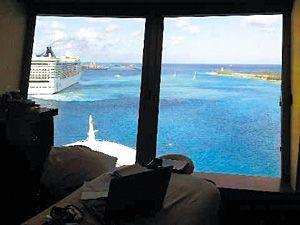
Acupuncture can now be found on 104 cruise ships today, spanning 12 different cruise lines throughout the world. To date the acupuncture program on cruise ships has done over 541,000 acupuncture treatments.
Working as an acupuncturist at sea is now a viable job option for practitioners seeking employment outside of private practice. It is also an ideal alternative for new acupuncture school graduates who are seeking opportunities that offer a traditional setting. Certainly the freedom of travel, the opportunity to save money, and the idea of adventure are what lures many acupuncturists into applying for this job. But, it is the experience in treating patients, in developing business/marketing techniques, and in practicing communication skills so vital to the profession that provide lasting benefits for our acupuncturists aboard cruise ships.
The Experience
Lisa Forsythe, who is a veteran acupuncturist at sea said she signed on to work on one Alaskan cruise to venture out into a new opportunity and found the experience had exceeded her expectations, leading her to sign up for five more cruises.
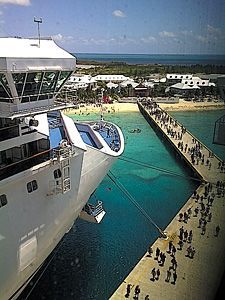
"I finally learned the business of healing as I promoted and practiced my chosen profession," said Forsythe. "I was blessed to circumnavigate the globe three times, visiting over 100 countries. Not only did I explore the world, I grew to become an empowered professional. Working on ships is the equivalent of gaining a Masters of Business in acupuncture. The challenges provided me with skills to sell myself with confidence. I am forever grateful."
The advantages of working on board are many, as are the challenges. Acupuncturists that work at sea generally work long hours, do multiple seminars-often to a skeptical audience-and live on the confines of a ship. For those that are willing to take upthose challenges, the rewards are immense.
"Working on the ship as an acupuncturist was one of the best decisions I ever made", said acupuncturist Jasmine Woo. "Where in the world can you make good money with travel benefits and still change people's lives? Do I have challenges on ship life? Of course, but it is the same whether you are on land or sea. Rather than focusing on the negative aspects of living on a cruise ship, I decided to focus on the positive so that I could get as much out of the experience as possible."
One important aspect to remember about working on a cruise ship is that living on a ship is like living in a state of flux. Things are constantly changing—people, places, friends, patients, environments, food etc. This too can be a challenge for those who need consistency or a set routine. But many acupuncturists opt to work at sea because they want something different, are seeking a change in their lives, are open to a variety of experiences and are able to adjust their routines to meet their changing circumstances.
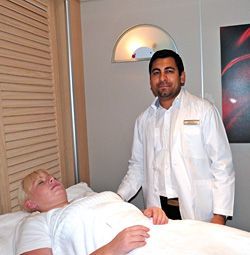
"In order to work on ships, you need to be very flexible. Change is the operative word," said acupuncturist Martha Vollenweider.
Vollenweider said depending on the length of the cruise -7, 10, 14 days - the ship embarks and debarks several thousand guests. Crew members are changed on a regular basis, depending on the length of individual contracts. But it is a change that keeps the job interesting and reflects the constant shifting of scenery and locales.
"On the first day of the cruise, everyone coming on board is wide-eyed with enthusiasm and expectation and that is a spirit that carries through for the remainder of the cruise. Those who work on ships quickly acclimate and eventually anticipate waking up in a different port each day," said Vollenweider. "One day arrive in Stockholm and the next drop anchor in St. Petersburg. Stop-over in Rome and the next day cruise into Athens. In my experience as an on-board acupuncturist, I found ample time to venture out into port cities, free to explore, free to leave behind the demands of shipboard duties and better able to return to those duties, relaxed and renewed for the next leg of the journey."
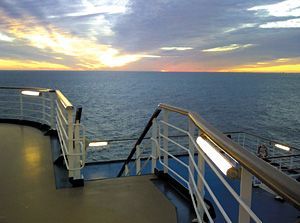
The success of each acupuncturist is determined largely by their willingness to promote Traditional Chinese Medicine. Recent graduates are often found lacking in skills that allow them to sell to others what they have spent four years learning and cultivating for future practice. It is, however, a vital component in the success of acupuncture at sea as it is for all who hope to make a living practicing Traditional Chinese medicine. As Martina Sturm, a practitioner with over four years of experience on board said, "Needles do not sell themselves."
The Requirements
Acupuncturists who work at sea are trained in business and communication skills before boarding their ships. These are essential elements that are often neglected in professional preparation and the training we provide is invaluable in filling in that gap as well as preparing acupuncturists to be better practitioners.
Acupuncturist Rachel Waldman said when she graduated TCM school in 2008, she had almost nothing in the way of savings, a lot of debt and no desire to work at anything other than acupuncture after four long years of hard schooling. The idea of slowly building a private practice with everything it entails just wasn't nearly as attractive as stepping into a "job" where she could focus entirely on treating patients.
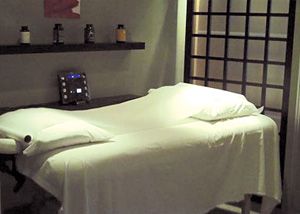
When Waldman looked for opportunities on a cruise ship, she noticed the spa manager handled back office paperwork, the shore side team handled stock and supplies, the receptionist handled scheduling and referrals came fast and furious.
"Your sole job on the ship is to be a good acupuncturist," said Waldman who still works at sea in the Caribbean.
The majority of the patients she treats suffer from chronic pain conditions such as lower back pain, knee pain, arthritis, sciatica, fibromyalgia, neck pain, migraines. Her patient base consists of 50-70 patients a week.
"This sheer volume of experience has transformed me into a confident pain management and orthopedics specialist. I have developed strong public speaking skills and learned what works for me in terms of marketing and publicity. I've paid off some debt, saved money, gone on incredible vacations between contracts and made friends from all around the world. There are obvious sacrifices and challenges involved with life at sea and I know that I won't work on ships forever, but when I do return to dry land and hang a shingle of my own or take a position in an integrative setting, I know that I am prepared for success," said Waldman.
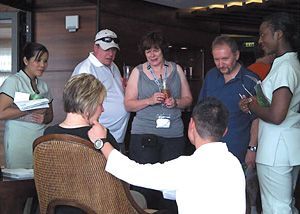
Cruising the vast oceans and high seas of the world aboard a luxury liner is a dream vacation by any standard.
The magnificent ships that set forth from ports on every continent offer a bounty of different experiences and new horizons for today's cruising population.
While guests on board are exploring faraway places and exotic locales, the on-board acupuncture program offers a unique opportunity to explore options for better health and promoting well being. It is a winning combination that confers benefits to both patients and practitioners.
And thus, on the confines of a ship at sea, the acupuncture program on board provides guests with the opportunity to explore healing and take a vacation not just from their stress, but from their ailments; to return home not just relaxed but rehabilitated and pain-free. It is just one avenue to accomplish this, however, it may ultimately prove to be a very important vehicle, literally between continents, miles out to sea, but spanning them in a common pursuit to provide healing to the many that seek relief.
For more information about working on a cruise ship, contact me at stephaniek@steinerleisure.com.


